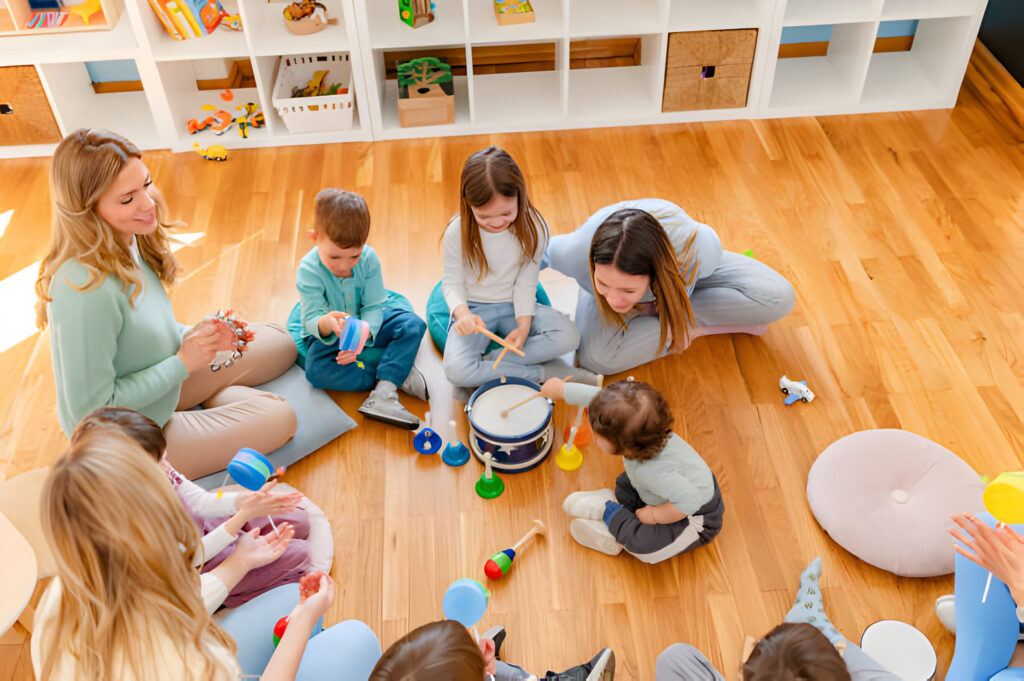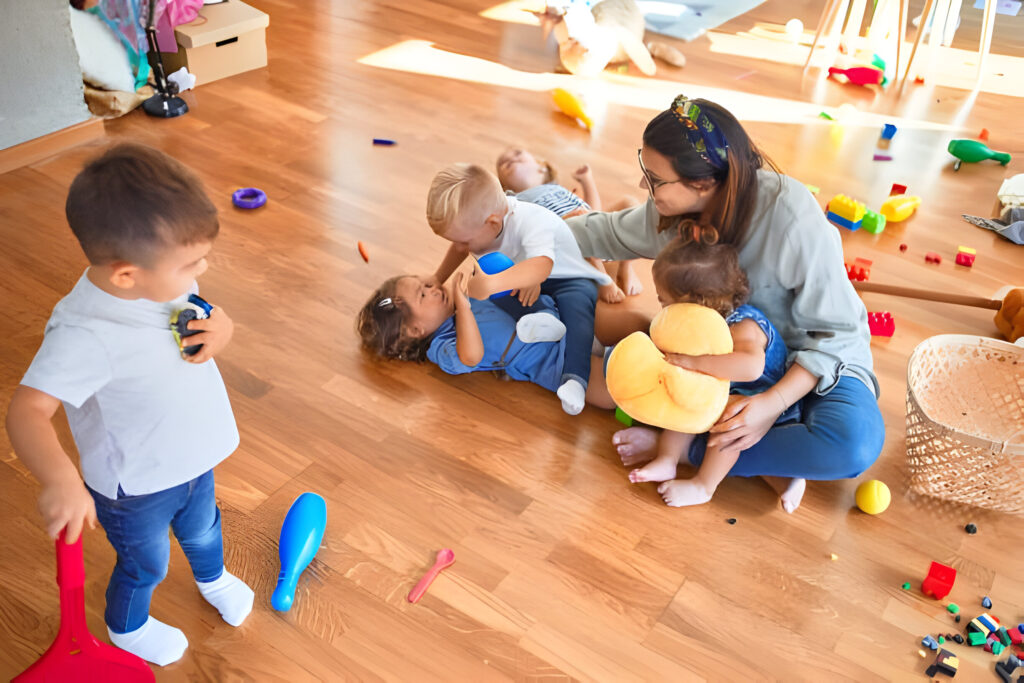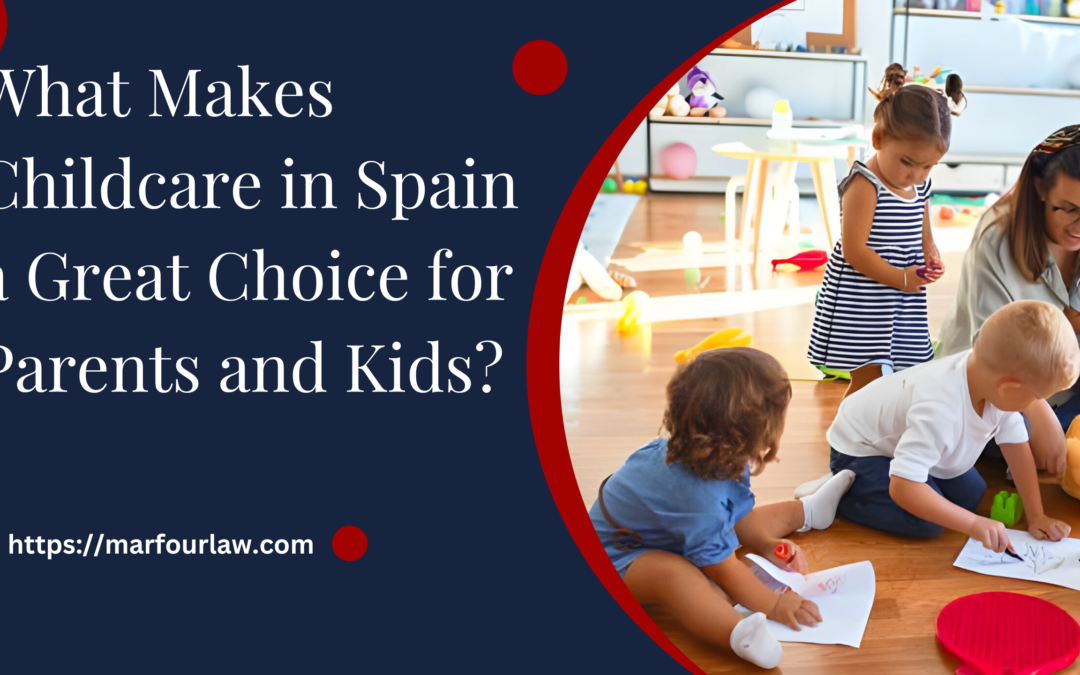Childcare in Spain offers a unique and supportive environment for both children and parents, making it an attractive option for many families. Whether you are a local resident or an expat, understanding the childcare system in Spain can help you make informed decisions for your little ones. With its warm climate, welcoming communities, and strong focus on family life, Spain provides an ideal backdrop for raising children. But what makes the Spanish approach to childcare so special? Let’s dive into how Spain supports its younger population through various childcare options.
What Childcare in Spain Looks Like for Families?
If you’re moving to Spain with children or already living there, understanding how childcare works is an important part of family life. Spain offers a variety of options for families, ranging from public services to private care, and the country’s strong emphasis on family-friendly policies can make finding the right solution easier. Here’s a look at what childcare looks like for families in Spain.
Public vs. Private Childcare Options
In Spain, you have the choice between public and private childcare. Public daycare centers, known as escuelas infantiles or guarderías, are government-run and often more affordable. However, spaces can be limited, especially in popular cities like Madrid and Barcelona. Fees for public childcare vary based on household income but are generally more affordable than private options.
Private daycare centers, on the other hand, tend to offer more flexibility and additional services such as longer hours or bilingual education. These centers are more expensive but are a popular option for families who need extra flexibility, particularly for parents with demanding work schedules.
Nurseries and Early Education
Childcare in Spain starts as early as 0-3 years, typically through nurseries or guarderías. This early stage of care isn’t mandatory but is often a necessity for working parents. Many nurseries offer stimulating environments with a focus on early education, incorporating activities that foster social skills and cognitive development.
From age 3 to 6, children move into the Infantil stage, which is part of Spain’s free public education system. At this age, most children attend school, where they engage in more structured educational activities. This stage prepares them for primary school and helps with socializing and basic skills development. The benefit here is that it’s not only an educational experience but also a free childcare solution for parents.
Hours and Flexibility
One of the key aspects of childcare in Spain is the flexibility of hours. Public childcare centers typically open from 9 a.m. to 5 p.m., while private centers often offer longer hours, sometimes from 7 a.m. to 7 p.m. This is particularly useful for working parents. Many centers also offer part-time or full-time options to suit different schedules.
Additionally, some schools and centers provide after-school care (actividades extraescolares) for older children, which includes a range of activities such as sports, art, or language classes. This extends the school day and helps parents manage their work schedules more easily.
Childcare Costs
Childcare costs in Spain vary depending on whether you opt for public or private services. Public daycare can cost as little as €100 per month in some areas, though this can rise based on income and other factors. Private daycare centers tend to charge between €300 and €700 per month, depending on location, services, and facilities offered.
For families with more than one child, there are often discounts available in both public and private centers. Additionally, the Spanish government offers subsidies and tax benefits for families, making childcare more affordable for lower-income households.
Family-Friendly Policies and Parental Leave
Spain is known for its family-friendly policies, including generous parental leave. New mothers are entitled to 16 weeks of paid maternity leave, and new fathers can take up to 12 weeks of paternity leave, which can be shared between the parents. Additionally, many workplaces offer flexible hours for parents or the ability to work part-time while children are young, making balancing work and childcare more manageable.
Nanny and Au Pair Services
For families seeking more personalized care, nannies or au pairs are also a common option in Spain. Nannies can be hired full-time or part-time, and their duties often go beyond childcare, including light housework or tutoring. Au pairs, who typically come from abroad, live with the family and provide help with children in exchange for accommodation, meals, and a stipend. This can be a great way for children to learn another language while receiving care in a home environment.
How Early Education Starts With Daycare Spanish Services?
Early education in Spain begins even before children reach school age, often through daycare centers. Known as guarderías or escuelas infantiles, these centers provide more than just basic childcare; they introduce children to structured learning environments, laying a foundation for their future education. Let’s explore how early education begins with daycare services in Spain and what parents can expect for their little ones.

Daycare for Infants (Ages 0-3)
In Spain, daycare centers accept children as young as a few months old. For many working parents, guarderías offer a safe, nurturing environment where children are cared for while they’re at work. At this stage, the focus is primarily on socialization and emotional development, but learning happens too — often through play.
Daycare services in Spain aim to stimulate children’s curiosity, helping them develop motor skills, language, and early cognitive abilities through age-appropriate activities. These might include music, storytelling, crafts, and simple group games. Although not formal education, these activities start building the foundation for communication and social interaction.
Structured Learning Begins at Age 3
When children turn three, they typically move into the Infantil stage of education, which is part of Spain’s public education system. This stage, often offered at daycare centers, is free for all families, making it an attractive option. The Infantil stage is a more structured educational environment, focusing on key areas like:
- Language Development: Teachers help children develop vocabulary and communication skills through reading, storytelling, and interactive discussions.
- Basic Numeracy: Simple counting games and activities introduce children to numbers and early math concepts.
- Social Skills: Children learn how to share, work in groups, and develop relationships with their peers.
- Creativity and Motor Skills: Activities like drawing, building, and dancing help foster creativity and fine motor skills.
Role of Play in Early Learning
In Spanish daycare services, play is a crucial part of the learning process. Whether it’s imaginative play, physical activities, or hands-on crafts, children are encouraged to explore the world around them through fun and engaging activities. These playful interactions help kids develop problem-solving skills, independence, and confidence, all of which are important as they move towards formal schooling.
Bilingual Education in Some Daycares
In many parts of Spain, especially in regions like Madrid, Barcelona, and international hubs, bilingual or even trilingual daycare services are becoming more common. These daycares introduce children to English or other languages early on, giving them a head start in language learning. This is particularly beneficial for expat families or those who want their children to grow up speaking multiple languages.
Flexible Hours for Working Parents
Another key aspect of daycare in Spain is the flexibility offered to working parents. Many daycare centers have extended hours, often from 7 a.m. to 7 p.m., allowing parents to manage their schedules. Full-time and part-time options are available, and some centers even offer extra services like meals or after-hours care. This flexibility ensures that children get the care and attention they need while parents maintain a balance between work and family life.
Why Spanish Families Take Advantage of Flexible Childcare Options?
In Spain, flexible childcare options are a boon for families, offering a range of benefits that align with the diverse needs of modern parents. From accommodating work schedules to providing a nurturing environment for early development, these flexible services play a crucial role in balancing family life. Here’s why Spanish families find these options so valuable.
Balancing Work and Family Life
One of the primary reasons Spanish families opt for flexible childcare is to better balance work and family responsibilities. Many parents in Spain work long hours, and traditional 9-to-5 schedules often don’t align with school or daycare hours. Flexible childcare options, such as extended hours at daycare centers or after-school programs, allow parents to manage their professional commitments without sacrificing time with their children. This flexibility helps reduce stress and improve overall family well-being.
Catering to Diverse Work Schedules
Spain has a varied work culture, with some professions requiring early starts or late finishes. Flexible childcare services accommodate these diverse work schedules by offering early drop-off times and late pick-up options. For example, many daycare centers provide care from as early as 7 a.m. to as late as 7 p.m., making it easier for parents to align childcare with their work hours. This adaptability is especially beneficial for dual-income households where both parents work.
Providing Quality Care During Non-Traditional Hours
In addition to extended hours, some childcare centers offer weekend or night care. This is particularly useful for parents who work irregular hours or have jobs that don’t fit into the traditional workweek. By offering high-quality care outside standard hours, these services ensure that children are well looked after and engaged, even when parents have unconventional work schedules.
Supporting Single and Working Parents
Flexible childcare is a game-changer for single parents and those juggling multiple responsibilities. For single parents, the ability to access flexible childcare can be crucial in managing both work and childcare needs. It provides the necessary support to maintain a stable work-life balance while ensuring that children receive consistent care and education.
Enhancing Early Childhood Development
Flexibility in childcare doesn’t just benefit parents; it also supports early childhood development. Extended hours and varied activities allow children to engage in enriching experiences beyond traditional school hours. Many centers incorporate activities that promote social skills, language development, and creativity, providing a well-rounded environment for growth. This flexibility helps ensure that children receive comprehensive early education, regardless of their parents’ schedules.
Enabling Parental Involvement
Flexible childcare options often include programs that encourage parental involvement. For instance, some centers offer workshops, parent-teacher meetings, and family events that fit into varied schedules. This involvement helps parents stay engaged in their child’s development and strengthens the family-school connection. It also allows parents to balance their work and family roles more effectively, contributing to a more cohesive family dynamic.
Adapting to Modern Family Structures
Modern families come in many shapes and sizes, and flexible childcare options reflect this diversity. Whether it’s accommodating blended families, families with multiple children, or those with non-traditional work patterns, flexible childcare services are designed to meet a wide range of needs. This adaptability ensures that all families can find a solution that works for them, fostering a supportive and inclusive environment.
What to Know About Childcare in Spanish: Language and Cultural Integration?
If you’re considering moving to Spain and need childcare, there are a few things you should know to help your transition go smoothly. From language barriers to cultural differences, this guide will give you the inside scoop on how to integrate into Spanish childcare settings seamlessly.

Language Skills Are Key
In Spain, Spanish is the primary language, and while many locals speak English, it’s not always the case in childcare settings. If your child is going to a local daycare or school, they’ll likely be immersed in Spanish from day one. To make this transition easier, consider brushing up on basic Spanish phrases related to childcare. Knowing how to ask about your child’s day or communicate specific needs can make a big difference.
Understanding the Spanish Education System
Spain’s education system is different from that of many other countries. For young children, the emphasis is often on socialization and play rather than formal education. This can be a refreshing change if you’re used to a more structured approach. Spanish preschools and daycare centers typically focus on fostering a supportive and engaging environment for children, which helps them develop social skills and creativity.
Embracing Cultural Differences
Cultural norms play a big role in childcare in Spain. For example, Spanish children are often encouraged to be independent and participate actively in group activities. This might be different from what you’re used to, but it can be beneficial for your child’s development. It’s also common for Spanish children to have a more relaxed approach to discipline, with a focus on positive reinforcement rather than strict rules.
Finding the Right Childcare Facility
When choosing a childcare facility in Spain, it’s essential to visit several options and talk to the staff. Ask about their approach to education, their policies on communication with parents, and their experience with non-Spanish speaking children. This will give you a clearer picture of how they handle language barriers and how well they integrate children from different cultural backgrounds.
Building a Support Network
Finally, connecting with other expatriates or local parents can be invaluable. They can offer tips on navigating the Spanish childcare system and help you find resources to support your child’s adjustment. Community groups, online forums, and local parent associations can be great places to start.
Adapting to childcare in Spain involves more than just adjusting to a new language; it’s about embracing a new way of nurturing and educating your child. By preparing yourself with a bit of language practice and a willingness to adapt to cultural differences, you’ll help your child thrive in their new environment.
How to Find the Right Daycare Spanish Program for Your Child?
Finding the right daycare for your child can be a challenge, especially if you’re navigating a new country and language. Here’s a straightforward guide to help you find a Spanish-language day care program that suits your child’s needs.
Start with Research
Begin by researching day care centers in your area. Look for programs that offer Spanish immersion or are fully bilingual. Use online resources, local forums, and social media to gather recommendations and reviews. Asking other parents in your community can also provide valuable insights.
Visit Potential Centers
Once you have a list of potential day care centers, schedule visits to see them in person. Pay attention to the environment—cleanliness, safety, and how welcoming the staff are. Observe how they interact with the children and how comfortable your child seems in their presence.
Evaluate the Program’s Curriculum
Different day care centers have varying approaches to education and care. Look for programs that balance play with learning, as this is crucial for early childhood development. Check if the curriculum includes activities that support language acquisition and if it’s designed to cater to both Spanish-speaking and non-Spanish-speaking children.
Check Staff Qualifications
The quality of care is often tied to the qualifications and experience of the staff. Ensure that the caregivers and teachers are well-trained and have experience working with young children. Inquire about their approach to bilingual education and their strategies for helping children adapt to a new language and culture.
Consider the Ratio of Caregivers to Children
A lower caregiver-to-child ratio generally means more individualized attention for each child. This can be especially important in a new language environment, where personalized support can help ease the transition and foster better language acquisition.
Assess Cultural Integration
Since your child will be in a Spanish-speaking environment, consider how the day care supports cultural integration. Look for programs that celebrate Spanish culture through activities, holidays, and traditions. This can help your child feel more connected and engaged in their new surroundings.
Communicate Your Expectations
When speaking with day care providers, clearly communicate your expectations and any concerns you might have. Discuss your child’s needs, especially if they require additional support in language development or have specific cultural needs. Ensure that the program is flexible and willing to accommodate your family’s requirements.
Get Feedback from Other Parents
Finally, talking to other parents who have experience with the day care can provide a clear picture of what to expect. They can share their experiences, including any challenges they faced and how the center addressed them.
What Are the Costs and Benefits of Childcare in Spain?
When you’re looking at childcare options in Spain, you might be wondering what’s involved in terms of both costs and benefits. Whether you’re a local or considering moving to Spain, knowing what to expect can help you make an informed decision for your family.

Costs of Childcare in Spain
The cost of childcare in Spain can vary widely based on where you live and the type of care you choose. In major cities like Madrid and Barcelona, you might find higher fees compared to smaller towns. For example, full-time daycare for infants can cost anywhere from €300 to €1,000 per month. This range typically reflects differences in the type of facility, its location, and the services offered.
If you opt for private childcare, expect to pay more than you would for public options. Private centers often provide more flexible hours and additional activities, which can be a significant advantage if you need extended care. On the other hand, public childcare centers might offer lower rates but often have longer waiting lists and less flexibility.
Additionally, the costs might include extra fees for meals, materials, and special activities. It’s a good idea to check what’s included in the fees and whether there are any additional costs you should budget for.
Benefits of Childcare in Spain
Despite the costs, there are several benefits to enrolling your child in a childcare program in Spain. One of the biggest advantages is the quality of education and care. Many childcare centers in Spain follow a structured curriculum that helps children develop essential skills and socialize with their peers. This early educational foundation can be incredibly beneficial as your child grows.
Moreover, Spanish childcare centers often offer a nurturing environment where your child can learn and play. The staff are generally well-trained and focus on creating a supportive atmosphere. This can give you peace of mind knowing your child is in good hands while you’re at work.
Another benefit is the flexibility that some centers provide. Many offer extended hours and additional services, such as language classes or extracurricular activities, which can be a great way for your child to get extra stimulation and exposure to new experiences.
Balancing Costs and Benefits
Finding the right balance between costs and benefits is key when choosing childcare in Spain. Consider what’s most important for your family and how different options align with your needs and budget. If quality and convenience are top priorities, you might lean towards a private center, even if it means higher fees. However, if affordability is crucial, exploring public options or looking for subsidies and financial aid could be beneficial.
Ultimately, investing in childcare can have a positive impact on your child’s development and your family’s well-being. By carefully weighing the costs and benefits, you can make a choice that best supports your family’s needs and gives you confidence in the care your child receives.
If you need more specific advice or assistance with finding the right childcare option in Spain, feel free to reach out. We’re here to help guide you through the process and ensure you make the best decision for your family.
Marfour International Law Firm specializes in providing legal guidance for families navigating the complexities of moving to or living in Spain, including matters related to childcare. Whether you’re an expatriate seeking advice on enrolling your child in a Spanish day care or need assistance understanding Spain’s family law regulations, Marfour’s team offers expert legal support.
Their services can help ensure a smooth transition for families by addressing key concerns such as residency requirements, language barriers, and accessing public or private childcare options. With Marfour, families can feel confident in securing the best possible childcare solutions while complying with Spanish legal frameworks.
FAQs
Is childcare in Spain expensive?
Childcare in Spain varies in cost. Public day care centers are affordable, but private options can be more expensive. It’s possible to find something within your budget.
At what age can children start day care in Spain?
Children can start attending day care in Spain as early as a few months old, though many begin between 6 months and a year.
How do Spanish day care centers handle language barriers?
Many centers, especially in major cities, offer bilingual support for children who don’t speak Spanish, helping them adjust to the new language environment.
Do Spanish day care centers focus on education?
Yes, early childhood education is a significant component of day care in Spain, with a focus on developing both social and academic skills.
How important is family in Spanish childcare culture?
Family plays a vital role, with extended relatives often helping with childcare, especially for younger children.
Conclusion
Childcare in Spain offers a wide range of options for families, with a strong emphasis on flexibility, early education, and family involvement. Whether you’re looking for day care Spanish services or relying on help from extended family, the country’s childcare system is designed to meet the needs of younger children and their parents. With so many options available, finding the right solution for your family is easier than you might think.

